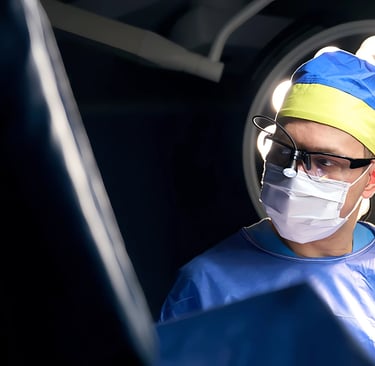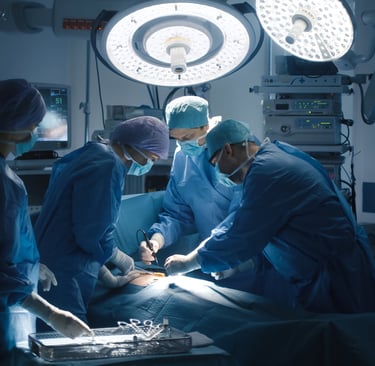General surgery:
4/22/20253 min read


General surgery: when to consult a specialist
The information in the article is provided for review and is not a guide to self-diagnosis and treatment. If symptoms of the disease appear, you should consult a doctor.
Contents:
What diseases does general surgery treat?
When is it appropriate to consult a surgeon?
How to diagnose a surgical disease?
How is preparation for surgery, treatment and postoperative recovery carried out
Laparoscopic and traditional surgeries
Frequently asked questions
Most people are afraid even of surgery, because a visit to a surgeon is associated with diagnostics and treatment of inflammatory processes in the body, damage to soft tissues, purulent wounds. However, this does not mean that every visit to a doctor ends with surgery. General surgery today offers many gentle treatment methods, for most of which the KAF clinic uses minimally invasive surgeries. With the help of laparoscopes and other devices inserted into the body through micro-incisions, doctors perform all manipulations remotely, with microscopic instruments and under observation through micro-cameras on monitors. Only in cases where this is impossible, a classic operation is prescribed. Modern surgery "KAF" is equipped with modern diagnostic, therapeutic and surgical equipment, and operations are performed only by the best highly qualified specialists.
What diseases does general surgery treat?


General surgery performs surgical treatment of hernias, diseases of the abdominal and thoracic cavity, inflammatory and purulent diseases of the skin, blood vessels, subcutaneous fat, removes neoplasms. These are appendicitis, cholecystitis, hemorrhoids, pancreatitis, rectal polyps, phlegmon, abscesses, furuncles, congenital pathologies of organs or systems, processes that have turned into forms of atrophy, sepsis or peritonitis, all types of hernias, gastric ulcers and twelve diseases.
When is it advisable to consult a surgeon?
Often, a disease can develop over years, and surgical pathology can develop to an acute condition within a few hours. Even chronic diseases can become acute and require surgical intervention. In this case, patients need emergency surgical care.
A medical consultation with a surgeon is necessary if you have:
cut and puncture wounds with damage to soft tissues
any purulent-inflammatory processes of the skin, purulent abscesses, long-term non-healing wounds, etc.
existing neoplasms
hernial protrusions in the groin and abdominal area
enlarged lymph nodes of any localization (cervical, inguinal and axillary)
suppuration in the area of the nail plate
varicose veins and spider veins
frequent intense pain in the abdominal area, which becomes less pronounced, but does not go away, with the appearance of nausea, a violation of the act of defecation.
unpleasant sensations in the anus; presence of blood during bowel movements
headaches, pain in the limbs, hematomas associated with trauma or falls
lower back pain and prolonged back pain
urination disorders, blood in the urine
pain and swelling of the vessels of the lower limb; changes in sensitivity, temperature and color of the lower limb;
a tick on the body and it needs to be removed.
Attentiveness to your body and reaction to emerging new symptoms often helps to avoid complications in the development of the disease, the occurrence of a tumor and surgical intervention in general. Therefore, if you have these symptoms, do not postpone a visit to a surgeon.
How to diagnose surgical disease?


In addition to an objective examination using a survey, palpation, auscultation, percussion of the patient, the surgeon may prescribe tests and additional examinations:
Standard laboratory diagnostics, including a clinical blood and urine test, a biochemical blood test.
-Ultrasound diagnostics
-Endoscopic examination (FGDS, colonoscopy)
-X-ray diagnostics, CT, MRI
How is preparation for surgery, treatment and postoperative recovery carried out
The KAF clinic has a 24-hour surgery and intensive care unit, where surgeons with extensive experience help patients with suspected surgical pathology. Modern equipment and new treatment methods in the clinic allow many surgical interventions to be performed under local anesthesia and without hospitalization of the patient. An operating room and intensive care unit of world standards, a resuscitation unit with systems for 24-hour monitoring of vital signs, an artificial lung ventilation apparatus and a defibrillator, and modern wards for recovery after operations - all this works for comfortable treatment and minimization of pain even in acute surgical conditions and as soon as possible.
Laparoscopic and traditional surgeries
To treat patients, the clinic uses both outpatient procedures, the so-called one-day surgery, and traditional surgeries.
Laparoscopic surgeries are almost always performed without conclusions, and the recovery period after them is very short, so the patient can go home on the same day after the operation, and go back to work in a couple of days.
Complex surgical interventions are performed with conservative treatment, careful preparation for operations and postoperative observation in a modern hospital. During the postoperative recovery, patients are given medication, surgical dressings and wound treatment, professional monitoring of healing, proper nutrition is provided, and systematic consultations with the surgeon take place. For rehabilitation, the patient receives an individual plan, which prescribes physical exercises, diet, necessary physiotherapy procedures, therapeutic exercise, massages and observation of the necessary doctors.
Clinic
Modern medical services for the whole family.
coll us
Quality
© 2025. All rights reserved.
+380677886657
+380932993555